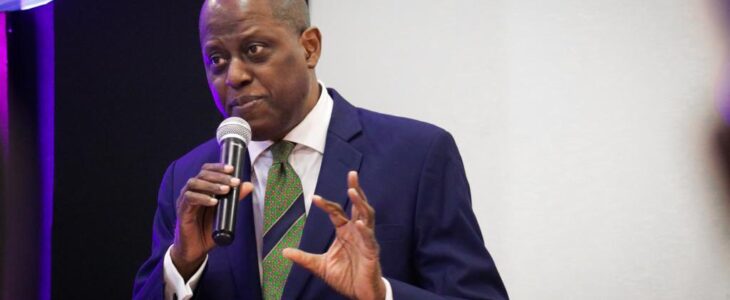
The new governor of the Central Bank of Nigeria (CBN), Olayemi Michael Cardoso, and the four CBN deputy governors nominated by President Bola Tinubu assumed office last week. The deputy governors are Emem Usoro, Muhammad Abdullahi-Dattijo, Philip Ikeazor and Bala Bello. Their nomination is in line with Section 8 (1) of the CBN Act, 2007, which empowers the President to appoint the governor and deputy governors of the apex bank for a five-year term in the first instance.
The tasks before Cardoso and his team are enormous. They are also surmountable. The CBN governor is eminently qualified to tackle the challenges. He will pragmatically address the dwindling value of the naira, rising inflation and soaring interest rates. Cardoso and his team should step up efforts to restore confidence in the economy by addressing the stated challenges, beginning with protecting the naira from its present free fall, sanitise the banking sector and impose maximum penalties on errant operators and bankers.

As at last week, the naira exchanged at almost one thousand naira to a dollar (N1,000/$1) in the parallel market. This implies that harmonisation of the exchange market is not working. The unification of the exchange rates has had no positive impact on the rate regime, neither has it shown any improvement in the overall monetary policy. There is panic in the foreign exchange (fx) market. The damage on the economy is incalculable, as arrears of forex to different interest groups have not been sorted out despite CBN’s assurance to do so within two weeks.
Certainly, the demand for forex outweighs supply. Therefore, there is need to restore confidence in the market. We advise that Cardoso and his team should focus on generating fx, which may include raising funds in the Eurobond market, as well as bilateral and multilateral funds, while building confidence that will attract forex in the medium term. The gap between the official and parallel market rates is unacceptable and should be abridged in order to attract export proceeds and diaspora remittances. In this regard, there is need to clear the backlog of fx.

The CBN under Cardoso should prioritise increasing Nigeria’s external reserves and stabilising the value of the naira. The decrease in our foreign reserves is not good for the economy. According to the CBN website, Nigeria’s external reserves have maintained a steady decline, dropping to $33.29 billion as at September 15, 2023. With the drastic drop in the external reserves, the CBN’s ability to defend the naira has declined by 10.17 per cent from $37.06 billion at the beginning of the year. The drop in the external reserves was also followed by low dollar inflows from oil proceeds as well as rising debt service payments and foreign exchange swap transactions. This is why the high demand for the dollar has exerted undue pressure in the forex market.
The CBN should initiate far-reaching monetary policies that will bring down headline inflation rate. For example, August headline inflation was 25.08 per cent, the highest since September 2005. This was attributed to a spike in the price of petrol and the depreciation of the naira. Month-on-month headline inflation increased to 3.18 per cent from 2.89 per cent recorded in July. Food inflation was 29.34 per cent. This represents an increase of 235 basis points when compared with the previous month.
There is need for the CBN to focus on the three components of inflation, core inflation, food and energy inflation. In addition, there is need to increase productivity in agriculture and other sectors to fight soaring inflation. In this connection, government should rejuvenate agriculture and squarely address insecurity to improve food production. There is the need for alignment between CBN’s monetary policies and government’s fiscal policies. It has also become necessary for the CBN to pursue low interest rate environment.
Therefore, the monetary policy tightening should not be used as a tool for taming inflation. We say this because a high interest rate at this time will constrain the supply of basic and intermediate goods. It will also undermine productivity. Having a low interest rate regime will stimulate money supply and productivity. This will be coordinated with relevant fx policies to prevent undue outflows of foreign exchange. The CBN must ensure that commercial banks direct credit to the real sector of the economy.
A steady reduction in the monetary policy rate (MPR) has become expedient. The forthcoming Monetary Policy Committee meeting should look in this direction. Let the CBN monitor transactions in the fx market and ensure transparency. The new CBN governor should lead by example and ensure transparency and accountability in accordance with the provisions of the CBN Act, 2007. He should avoid the mistakes of his predecessor and institute a culture of good corporate governance in the CBN.
Credit: Daily Sun
